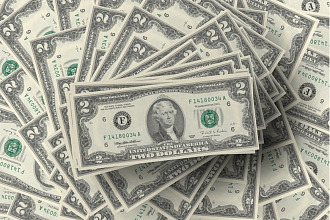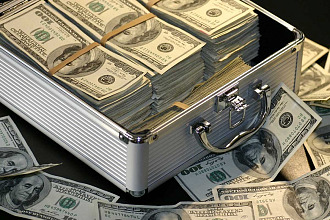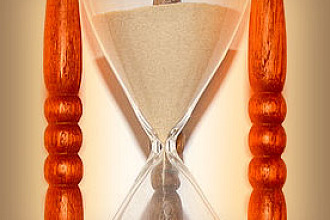At some point in your life, I'm sure you have said to yourself, "I wish I was really wealthy," or "I would like to live like a millionaire." In your mind, you visualized living in a palatial mansion surrounded by lush gardens. Inside all the comforts you could dream of: a spacious kitchen decked out with state-of-the-art appliances, a luxurious master suite and a closet filled with the latest fashions, a bathroom furnished with massage tub and bidet. Housed in the twelve-door garage, a dozen choice automobiles await your command to tour the town. Best of all, this mansion and all its amenities come equipped with gardeners to tend the gardens, chefs to prepare scrumptious meals, maids to tidy the rooms, and chauffeurs to care for the cars.
While you're still dreaming, you see yourself lying on the beach in exotic locations, touring Europe or making a pilgrimage to the Far East, as annual, extravagant vacations are customary for the wealthy.
Even if my picture of ultimate wealth was a bit much for you, I'm sure you have had your moments when you said to yourself, "Having a little more money would certainly help out our current situation." However, the real truth is that the majority of millionaires live very modest lifestyles. In his most recent book entitled, Stop Acting Rich . . . And Start Living Like a Real Millionaire, Thomas J. Stanley, PhD, has discovered that the majority of millionaires live very unassuming and unpretentious lifestyles. As America's foremost authority on the affluent, Stanley presents the results of his interviews and surveys of the well-to-do, and the results are quite different than the assumptions you have of the rich.1
If you would like to live above your means and begin to live like the "rich and famous," the list below contains the economic realities and principles of basic money management, which millionaires tend to follow. Accompanying these are the unrealistic assumptions the majority of people believe are the core reasons most millionaires are wealthy.
Assumption: Millionaires live in spacious mansions or at least in upper-class golf course neighborhoods.
Reality: Approximately 90 percent of them live in homes under a million dollars. Actually, three times more millionaires live in houses valued at less than $300,000.2 Most readers will be shocked that over 67,000 millionaires reside in mobile homes. 2
Why So Frugal: In the United States most people believe real estate is an excellent long-term investment. It is true that homes usually increase in value, but large houses also have hefty expenditures such as heating and cooling, maintenance, property tax and insurance. Millionaires know purchasing a modest home in a middle class neighborhood decreases the pressure to not only spend money that could be invested in the stock market earning them more revenue, but reduces the social pressure to fit in a more expensive neighborhood.
Assumption: Millionaires have many holiday homes and vacation residences.
Reality: When it comes to secondary homes, 64 percent of millionaires surveyed have never owned a vacation home, a beach bungalow or a mountaintop cabin, let alone a lean-to or tree hut in the woods. According to the National Association of Realtors, the typical second home buyer has a median household income of just over $80,000.2
Why So Frugal: The majority of millionaires understand the real cost of owning a second home, both in time and money, including commuting to, maintaining, and furnishing the dwelling. Plus, millionaires do not want to be "locked into" having a holiday in the same vacation spot year after year.
Assumption: Millionaires have lots of toys, such as boats, RV's, etc., that most of us will never own in our lifetimes.
Reality: More than 93 percent of those who purchased a boat are not millionaires. The majority of American millionaires have never owned any type of watercraft, be it yacht or dinghy. Of the ones who did purchase a boat during their lifetime, they sold it and never again acquired another. What may surprise you more is two-thirds of deca-millionaires have never been in possession of a sailboat, schooner, cruiser or any other type of vehicle that floats.2
Why So Frugal: The same reason millionaires do not have second homes applies to owning adult toys.
Assumption: Millionaires not only drive the very latest luxurious automobiles, but they own the real exotic models.
Reality: During the last decade, the millionaires surveyed have NOT owned or leased one of the following prestige automobiles:
Aston Martin (100%), Lamborghini (99.9%), Ferrari (99.7%), Maserati (99.6%), Rolls-Royce (99.6%), and Jaguar (92.6%). What may surprise you more is that they have not purchased these less luxurious vehicles: Lincoln (93%), Audi (93%), Saab (96%), Acura (89%), BMW (80%), Lexus (79%) and Mercedes Benz (75%). 86% of all expensive makes are driven by non-millionaires. The typical millionaire chooses a Toyota (11%) followed by Ford and Chevrolet. The median price paid by millionaires is in the $30,000 range, not the $75,000+ price range expected of this class.2
Why So Frugal: They were not looking for status, but for a vehicle that would cost less to maintain and be less noticeable to be broken into and stolen in a parking lot.
Assumption: Millionaires always look like they are dressed for success by purchasing the top-of-the-line clothes, shoes and accessories.
Reality: Millionaires shop for their clothes at a variety of stores and their favorites include: Macy's (27%), Kohl's (22%), Target (22%), and Costco (22%). With the ladies, Saks was on the bottom of the top ten places they like to shop. The top five included such retailers as Macy's, T. J. Maxx, and Target. In Stanley's surveys, the median range for the purchase of a suit was $299.50. It is a rarity that a millionaire buys a $5,000 suit; in fact, the ratio is 1 to 900. Only 1 in 944 millionaires indicated that his favorite brand of shoes were "custom made." The top five preferred brands were Allen Edmonds, Cole Haan, Johnston & Murphy, Florsheim and Rockport. Interestingly, when it comes to shoes, 70 percent of millionaires have them resoled. Surprisingly, one in five millionaires wear a Seiko watch and not far behind is another favorite – Timex.
The Bottom Line: The majority of millionaires, in large part, became prosperous because of their frugal lifestyle. Hence, by the time they reached the status of being really wealthy, they were so set in their ways they typically remained financially frugal. So if you are still single and desire to get married, then choose a spouse who is a tightwad.
Stewardship Perspective: If you were a millionaire, owned a fabulous mansion with ten spacious bedrooms and had all the luxuries previously mentioned, you still could only sleep in ONE bed, drive ONE car and eat ONE meal at a time. A true steward knows that a life of need is better by far than a life of greed.
References:
1. Thomas J. Stanley, PhD, Millionaires, Bottom Line Personal, March 1, 2010, page 1
2. Thomas J. Stanley, PhD, Stop Acting Rich... And Start Living Like a Real Millionaire,
John Wiley & Sons, 2009. Items and pages as follows: homes: pages 43‐45;
secondary homes: pages 40‐41; boats: page 39; vehicles: pages 180‐181;
clothes: pages 70‐73, 79‐81; shoes: pages 68‐69; watches: page 81.
Originally found in The Stewpot, July 2010, Volume 15, Issue #7

_medium.png)
























